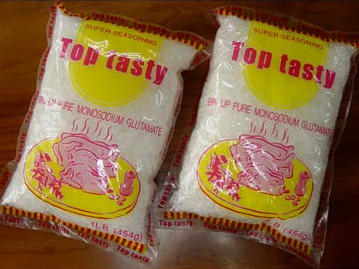
By Fang Ye (方也)
Issue 631, Aug 5, 2013
Lifestyle, page X
Translated by Laura Lin
Original article: [Chinese]
For more than 100 years, the food additive commonly known at MSG (monosodium glutamate) has been used all over the world to make dishes more savory. But the Chinese in particular are losing their taste for the ingredient, having embraced an irrational fear of what authorities around the world regard as a perfectly safe substance. Even manufacturers of MSG here have shut their doors.
It has become common practice in China, specifically among those who are sticklers for food quality, to request dishes that don’t include this non-essential amino acid. More and more amateur cooks, especially younger consumers, are banning it from their diets.
But is MSG actually harmful? According to reports by the World Health Organization and the UN Food and Agriculture Organization, it doesn't hurt the human body as long as it is consumed moderately. The U.S. Food and Drug Administration came to the same conclusion in 1995.
But baseless assertions continue despite these reports. The claims that it can cause cancer under high heat or that children will become dumb if they ingest too much have spread among the Chinese. Westerners are also anxious about the additive. Some have even concluded that it's because of this chemical compound that Chinese food is unable to rise to the status of haute cuisine, despite its popularity.
Most of those who reject MSG, though, do so not because it causes them discomfort but because of a general distaste for food additives, which are associated with industrial production and unhealthy fast food.
No, MSG is Not Chinese
After a doctor published a letter in The New England Journal of Medicine in the 1960s, reportedly meant to be light-hearted, the additive attracted medical suspicion. He complained that he felt neck and heart palpitations after eating in a Chinese restaurant, and the term “Chinese restaurant syndrome” was born.
In fact, MSG is neither a Chinese invention nor a traditional Chinese ingredient. It was Kikunae Ideka, a Japanese scientist, who discovered it in 1908 while trying to find the origin of a taste in the broth of kombu, a kelp widely used in Japanese cooking. He extracted the natural glutamate from the seaweed and named this good taste umami, a flavor that makes food more savory.
Though serious Western chefs tend to steer clear of MSG, it is just as present an ingredient in the United States as elsewhere. Mediocre Chinese chefs use it as a shortcut, yes, in the same way bad American cooks use it — along with sugar, salt and poor oil — to make French fries and other foods tastier. The flavor exists in all manner of American food as well as ethnic foods and condiments.
Western chefs, food writers and consumers believe the very existence and power of umami, the flavor, can be found only in haute cuisine, where it exists naturally, for example, in shittake mushrooms.
Flavor Before MSG
Before MSG came along, brewing soup stock to add flavor to dishes was already a basic survival skill of Chinese chefs. Creating superior soup stock is, in fact, a serious science for a Chinese cook. Many even have special cooking processes that they regard as secrets.
China is vast and possesses a variety of regional cuisines. Regardless of the region, a good stock is indispensable. While Cantonese chefs most often regard aged salty ham as an essential stock ingredient, cooks in the coastal region of Zhejiang and Jiangsu prefer dried seafood such as scallops. Others might use vegetables such as bamboo or mushrooms.
There’s a huge difference between soup stock and broth. Stock plays a supporting role and is integrated into a meal. It is the soul of a dish without getting the limelight. A good broth, meanwhile, exists on its own, either as a starter or an ending to a good meal.
Meanwhile, although MSG is no longer as commonly embraced as it once was, until people accept and understand the natural characteristics and original taste of foods, it will no doubt continue to have a place in our fast-paced global society.
News in English via World Crunch (link)
